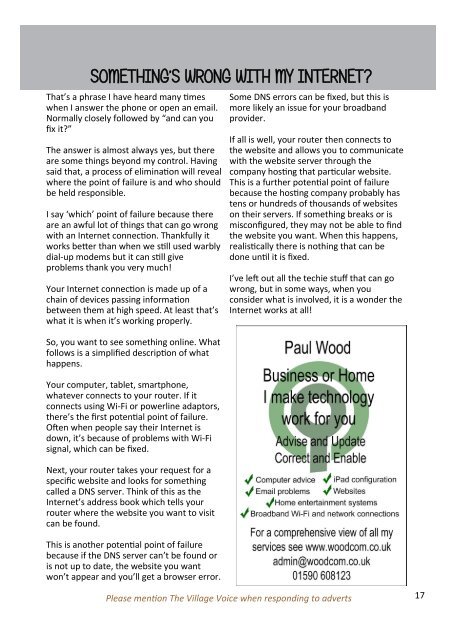Village Voice June July 19
community
community
You also want an ePaper? Increase the reach of your titles
YUMPU automatically turns print PDFs into web optimized ePapers that Google loves.
SOMETHING’S WRONG WITH MY INTERNET?<br />
That’s a phrase I have heard many times<br />
when I answer the phone or open an email.<br />
Normally closely followed by “and can you<br />
fix it?”<br />
The answer is almost always yes, but there<br />
are some things beyond my control. Having<br />
said that, a process of elimination will reveal<br />
where the point of failure is and who should<br />
be held responsible.<br />
I say ‘which’ point of failure because there<br />
are an awful lot of things that can go wrong<br />
with an Internet connection. Thankfully it<br />
works better than when we still used warbly<br />
dial-up modems but it can still give<br />
problems thank you very much!<br />
Your Internet connection is made up of a<br />
chain of devices passing information<br />
between them at high speed. At least that’s<br />
what it is when it’s working properly.<br />
So, you want to see something online. What<br />
follows is a simplified description of what<br />
happens.<br />
Your computer, tablet, smartphone,<br />
whatever connects to your router. If it<br />
connects using Wi-Fi or powerline adaptors,<br />
there’s the first potential point of failure.<br />
Often when people say their Internet is<br />
down, it’s because of problems with Wi-Fi<br />
signal, which can be fixed.<br />
Next, your router takes your request for a<br />
specific website and looks for something<br />
called a DNS server. Think of this as the<br />
Internet’s address book which tells your<br />
router where the website you want to visit<br />
can be found.<br />
This is another potential point of failure<br />
because if the DNS server can’t be found or<br />
is not up to date, the website you want<br />
won’t appear and you’ll get a browser error.<br />
Some DNS errors can be fixed, but this is<br />
more likely an issue for your broadband<br />
provider.<br />
If all is well, your router then connects to<br />
the website and allows you to communicate<br />
with the website server through the<br />
company hosting that particular website.<br />
This is a further potential point of failure<br />
because the hosting company probably has<br />
tens or hundreds of thousands of websites<br />
on their servers. If something breaks or is<br />
misconfigured, they may not be able to find<br />
the website you want. When this happens,<br />
realistically there is nothing that can be<br />
done until it is fixed.<br />
I’ve left out all the techie stuff that can go<br />
wrong, but in some ways, when you<br />
consider what is involved, it is a wonder the<br />
Internet works at all!<br />
Please mention The <strong>Village</strong> <strong>Voice</strong> when responding to adverts<br />
17


















